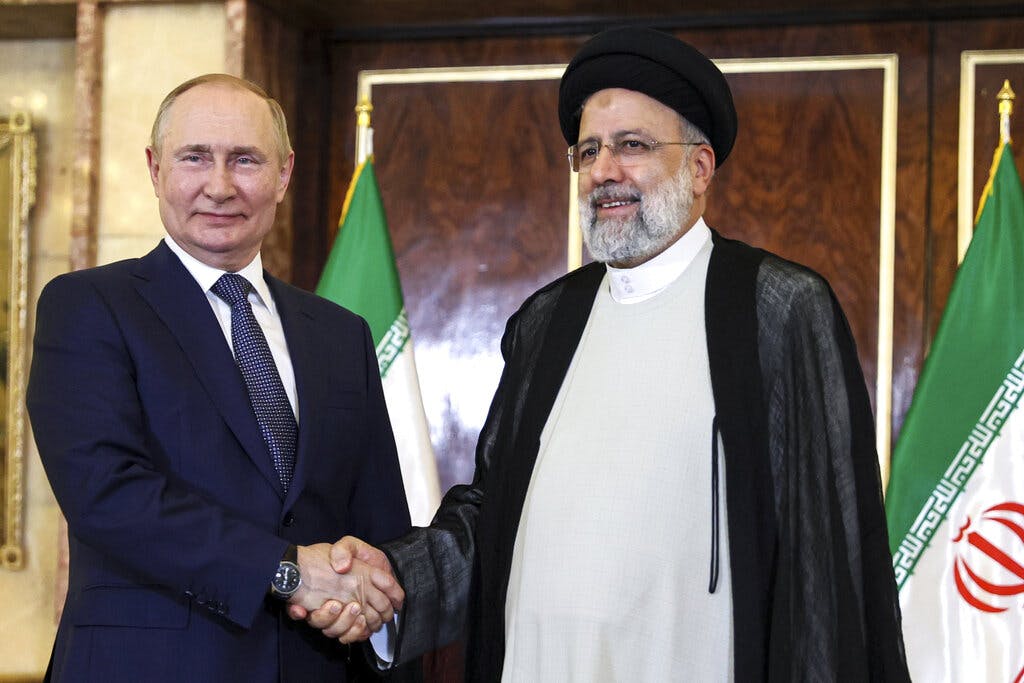John Bolton Calls for Stricter Enforcement of Sanctions
The Iran-Russia alliance in the Ukraine war is a perfect opportunity for America to unify allies in tightening sanctions on Tehran and Moscow.

Iran’s role in helping arm Russia for the Ukraine war is a game-changer, an opportunity for America to unify allies in tightening sanctions on Tehran and Moscow, which to date have only been partially effective.
The Islamic Republic’s sale of drones and other arms to Russia has all but ended the American and European attempt at diplomatic rapprochement with Tehran. Minds have also been changed by the regime’s response to the hijab protests, which has resulted in a bloodbath on Iranian streets, but Iran’s entry into a war at the heart of Europe is a strategic wake-up call.
For one, Washington has finally all but dropped its attempts at renewing the 2015 Joint Comprehensive Plan of Action. Even the deal’s most enthusiastic European advocates are in retreat as well. Britain is actively considering adding the Islamic Revolutionary Guards Corps to its terrorist organizations list, as are several other European countries.
Ever tightening American and European sanctions have been imposed on Russia since the beginning of the Ukrainian war last February, yet Washington hawks say that the pressure on the two countries is insufficient, and that sanctions could be made much more effective.
“The irony here is that in the United States the biggest advocate of sanctions was Woodrow Wilson, because he thought it was the alternative to war — but he was also prepared to say it’s a very harsh thing to do,” a former national security adviser to President Trump, John Bolton, told the Sun.
Indeed, “if you apply and enforce sanctions effectively it could be a very harsh thing. That’s the alternative to war,” Mr. Bolton says. Conversely, poor sanction enforcement “means you’re doing really precious little more than virtue-signal.”
American and European sanctions include “long delays in the effective date,” the former American ambassador to the United Nations said. “The European prohibition on importing diesel fuel from Russia,” for one, “doesn’t kick in until February 5,” about a year after the war began.
Sanctions are typically announced with great fanfare, and then they don’t kick in, he said. When Mr. Trump withdrew from the Iran nuclear deal and announced the reimposition of all sanctions, “I could have kicked myself when I realized that the Treasury sanctions didn’t take effect for six months,” he said.
Sanctions are also poorly enforced. “Russia, Iran, North Korea — you name it — spend a lot of time and effort finding ways around sanctions, finding ways to mitigate sanctions. And we are not nearly agile enough in countering them,” Mr. Bolton said.
According to a Nikkei report, “Russia and Iran are working on a new shipping corridor that cuts Europe and its sanctions out of the picture, and are looking to partner with India.” The world’s largest democracy, India is a strong American ally in countering Communist China. Yet, it has struck a neutral pose on the Islamic Republic and Russia, much to Washington’s chagrin.
In contrast, America’s strongest Asian ally, Japan — whose prime minister and foreign and defense ministers are visiting Washington this week — has backed Ukraine financially. Yet, despite Iran’s military cooperation with Japan’s nemesis, North Korea, Tokyo has for decades maintained warm ties with Tehran.
While America and Europe have imposed various measures to punish Tehran for its harsh treatment of anti-regime protesters, “Japan is the only member of the G7 not to have imposed sanctions on Iran since September,” the policy director for United Against Nuclear Iran, Jason Brodsky, told the Sun.
The reason is that India, Japan, and other American allies have long depended on energy from Russia and Iran. These “resource-poor countries are the ones that you need not to simply get them involved in imposing sanctions, but give them practical solutions for their energy needs,” Mr. Bolton said.
Americans have long attempted to wean Tokyo from its dependency on oil supplies from Iran and other American foes. Mr. Bolton remembers how, during the President Bush era, he tried to talk Japanese counterparts out of oil investments in Saddam Hussein’s Iraq.
The answer, Mr. Bolton says, is to give such countries alternatives to their energy needs. “And one way of doing that would be to unleash the American oil and gas industries, so we can reduce prices in the United States and also sell overseas, which is an economic plus for us and a strategic alternative for our allies.”
Such an alternative, though, “has been blocked by the Biden administration’s obsession with climate change agreements, and the determination to weaken the oil and gas industries in this country,” Mr. Bolton added.
America can do much more to unite allies to better fight the burgeoning 21st century Cold War. The Iranian-Russian codependency could be utilized in that effort — if Washington indeed is willing to fully engage in that war.

